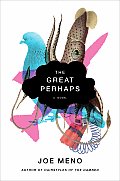| « Upcoming Book Swap/Drive | Some Odd-Fish Goings On » |
Reviews Wed Apr 29 2009
Review: The Great Perhaps by Joe Meno
 The Great Perhaps
The Great Perhaps
by Joe Meno
(W.W. Norton & Company, Inc., 2009)
Jonathan Casper is a coward. In fact, he heralds from a long line of men in whom cowardice is the one defining hereditary trait. For Jonathan, this cowardice manifests itself openly in his fear of clouds, the sight of which will throw him into an epileptic-like seizure, the fear having only been controlled through the use of neurological medications. Less immediate, however, this cowardice wreaks its havoc through Jonathan's life, threatening to ruin his marriage, estrange his children and jeopardize his long-standing career and his search for the prehistoric giant squid Tusotheuthis longa. It is a cowardice in father and grandfather that runs far past the English colonization of India, through the Franco-Prussian War and all the way back to a 1630 Arctic expedition. Make no mistake: this is a story about a coward.
But, to say that The Great Perhaps is just about a coward is, admittedly, a bit reductive. It is also the sweeping story of a family - both unique in its makeup and ordinary in its dysfunction - in crisis, trying desperately to remember what it means to depend on each other, move through life together and just be a cohesive unit. Set in 2004 in the midst of the Iraq War and the electoral race between George W. Bush and John Kerry, the Casper family is the perfect image of the liberal American family, with Jonathan conducting his research at the Field Museum and teaching at the University of Chicago where his wife Madeline conducts her own research on the social hierarchies of pigeons. Their daughters, Amelia and Thisbe, attend the university's private high school and could not be more different from each other. The elder Amelia is a neo-Marxist who wanders the school's halls bedecked with a black beret and writes inflamed social critiques in their newspaper, the Midway. Thisbe, much to the family's chagrin, has found God and, in between her chorus practices where her lack of vocal talent has relegated her to the role of piano accompanist, spends her time praying for her salvation and attempting to baptize the neighborhood animals.
Joe Meno's particular brand of eloquent, lucid, at times visceral, writing that we have come to know and love through his previous work is delightfully present here, but where he soars in this novel is in his ability to create a broad landscape through time, weaving in between the generations of the Casper family, in and out of its members' points of view, to help us understand this complex family in way that we, otherwise, could not. A significant portion of the novel is spent with Henry Casper, Jonathan's father, who, in his declining years, tries desperately to escape the confines of the nursing facility where he's been brought, counts his words carefully so that everyday he will use one less until he speaks no more and mails himself letters to be opened by his son once he's passed. Learning of Henry's history - his father's and uncle's involvement in World War II, his own inadvertent involvement in the dropping of the atomic bomb - works to create a rich, multi-layered canvas on which to paint the story of Jonathan's own fears and failings.
The story, though, is not without some hope. We end with the possibility that Jonathan and Madeline's marriage will survive, that Amelia will learn to refine her voice and express her social critiques in a productive way, that Thisbe will reconcile her desires with her belief in God, that Henry has finally escaped the guilt of his cowardly past. It is an upward movement that is neither overly emotional nor melodramatic, but simply the only way that a family trying to survive the crisis that is itself can move if it is to avoid destruction. It is a struggle common to our time that Meno details with the grace and skill of someone who has ardently captured the fight-or-flight nature of the human spirit. It is this perfect evocation of the American family that makes The Great Perhaps, to borrow the novel's closing words, both astonishing and quite ordinary.
Joe Meno is on the faculty of Columbia College Chicago where he teaches creative writing. His novel Hairstyles of the Damned was the inaugural GB Book Club selection.










M / April 29, 2009 1:51 PM
Great review, but please, please don't borrow from a novel's closing words...(any other words, sure)
It is an unwinding effect and I think may take the punch out of reading a novel's final passages, those passages which the author intends to stay with the reader for some time....
Otherwise, well done.